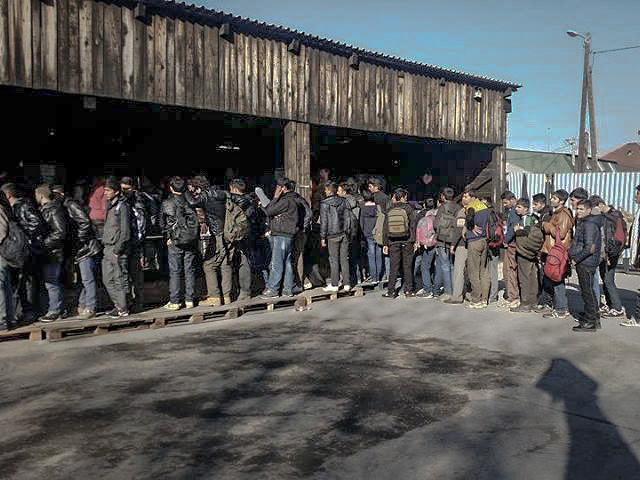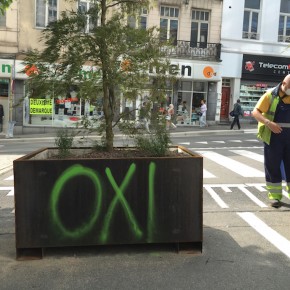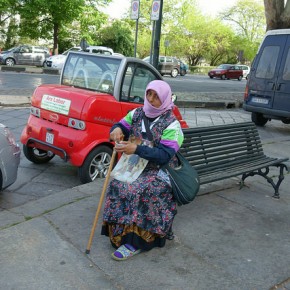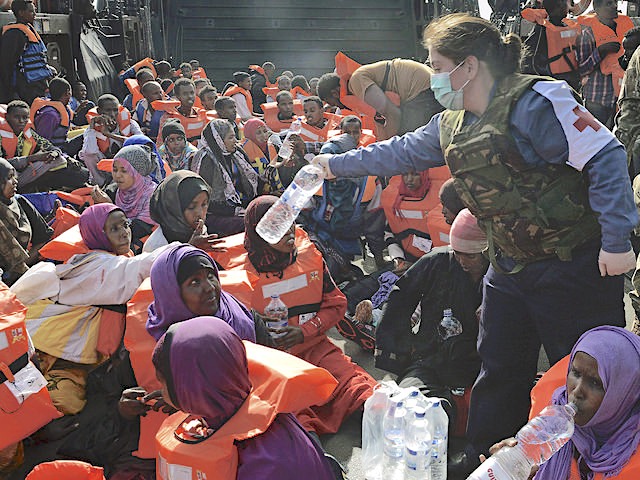When hundreds of thousands of refugees began traveling through the Balkans last summer, established humanitarian organizations were slow to react. Concerned citizens stepped in to fill the void. Enter Refugee Aid Serbia.
Originally a loose coalition of volunteers coordinating via social media, it is now preparing itself for the new year, as an equal number of refugees are expected to flee through the Balkans.
I spoke to Nenad Popovic, one of the co-founders of Refugee Aid Serbia, about the winter, volunteers, and the problems ahead.
An entrepreneur who grew up in the UK, the 28-year-old moved to Serbia in 2014 and founded the aid organization “Giving Back Serbia”. He co-founded Refugee Aid in 2015. This interview originally appeared in Neues Deutschland.
Thousands of people are still traveling through Serbia, Croatia. What is the situation like now in the winter?
At the beginning of the year, it snowed in Belgrade. The refugees are not prepared for the cold. Some would arrive with torn shoes and in light clothing. We immediately had to start handing out winter clothes and warm shoes, but we were running out quickly. We had to appeal to the public to provide aid. In Serbia, there are a few refugee camps, but other than that, there is nothing being done to offer them opportunities for housing, or places to sleep. In the summer, people would sleep in tents, or on the bare ground, but now they are trying to travel on as quickly as possible.
Since mid-December, due to the cold, the numbers started to slowly go down. Macedonia closed its border to anybody but Syrians, Afghans, and Iraqis. From 10.000+ refugees coming through Serbia daily during the summer, the numbers have dropped to a few thousand a day. But we fully expect that they will rise again, either once it gets warmer, or because the EU changes its policy. We have to prepare ourselves to function, while again dealing with a few thousands refugees every day traveling through Serbia.
In August, an improvised camp formed in Belgrade’s Bristol Park, in the center of the city. You have been with RAS from the very beginning. What was the situation like then, and why was RAS founded?
I had my own organization, Giving Back Serbia, which was focused on providing support and education to disadvantaged Serbian youth, as well as to providing education for volunteers during humanitarian crises. I didn’t consider it to be humanitarian in purpose, but about empowering people.
In August, we saw the situation at Bristol Park. The government wasn’t doing anything about it, so we decided to start cleaning the park, to organise the camp, and to empower the refugees to help us out as well. But we saw that that wasn’t enough, and we started thinking about how to be more impactful. We started talking with other organizations, and that was how RAS was formed. Instead of everybody trying for themselves, we wanted to work together under one name towards a common goal. It was tough towards the beginning, but as the days progressed, we started to cooperate more effectively. It was a good thing. Since we started RAS, I have been fully committed to it. I am still achieving my goals. Inly now I am working not with Serbian youth, but with refugees.

You are also collecting money to provide aid in Greece. What is your plan?
We are focused on bringing aid to where the masses are, and right now that is in Greece. There are a few groups, who are now working in Greece, who have volunteered with us in Serbia when we needed it the most. Now that it is a little calmer here, it is only fitting that we go and support them in turn. In Greece, the people are starved and refugees are not getting the aid they need. We will go through Athens to one of the islands, Lesbos or Kos, where help is needed 24 hours a day: bringing in boats, transferring people to safety, and so on.
Your organization was founded as a reaction to an emergency situation, but it does not look as if the emergency will be over any time soon. Do you have the sense that RAS is becoming a permanent organization? How are you preparing for the next year?
There is no doubt that there will be many more refugees coming again in the spring and summer. We have decided to become an officially registered charity, non-profit, so that we can seek grants and are not limited to receiving private donations alone. We want to be more effective in targeting refugees’ needs. In the coming days, we will register as an official organization so that we can start preparing for the next wave of refugees.
Originally, you did not accept financial donations.
Yes, we were really focused on transparency and wanted to avoid any talk of corruption. But now, as we are preparing to keep up our work in the long run, we will have an official bank account, and we will be able to keep a proper trail of expenses in order to be accountable. We will be able to officially take financial donations through our website, the way it is supposed to be.

Our entire work until now was made possible only by the support of private citizens. The government has mostly been assisting the Red Cross and the UN, and it hasn’t done anything to aid ad hoc organizations like us, even though, at least in Belgrade, I can comfortably say that we have been the most effective organization providing aid. Most of our donations are coming from private citizens in Belgrade, and some businesses as well. In the summer, we had convoys coming in from Croatia, Slovenia, and Bosnia. That has really helped us out.
And you are hoping that volunteers will keep supporting your work in the future.
Oh, absolutely. The work we did in the fall has been so successful and important that I have no doubt that people will continue to volunteer as soon as the weather picks up again. We are getting messages every day from people who want to work with us.
We’ve had people donating aid from from America, and the UK, and we’ve had volunteers from all parts of the world, from America to Australia [until now, RAS has counted over 50 different nationalities among its volunteers]. That’s why we changed our organization to be based around organizing the volunteers. This has made it what it is today: not a small group of people working by itself, but a network of people. We wanted to show the love and respect we have for anyone that has come and helped us out. We didn’t start this to advertise ourselves, or to promote ourselves in any way. It was the volunteers that helped us out in the toughest of times, when we were understaffed and needed help. And when a volunteer is a backpacker who is only in Belgrade for two days, but then decides to stay on, it is amazing.
Here in Germany, the idea is being floated again to close the border, or to at least limit the number of people who are allowed to enter to 200,000 a year, which would leave many outside. What do you think would happen then? Certainly Austria would follow as well, and people wouldn’t be able to move out of Croatia and Serbia anymore.
It would cause serious problems. The Serbian government is simply not prepared for something like this, and neither are the other governments in the Balkans. The refugees would be stuck. They would have no place to go, and we would run out of aid at some point. We would have no capacity to house or feed them. Even if that would happen, say, over the summer, it would cause huge tensions. But if it happens during the winter, I can’t imagine how that would impact Europe.
Postscript
Recently, following the tightening of border control by Denmark and Sweden, Germany has begun denying entry at the Austrian border to refugees who were planning to travel through the country further north. Now, Austria and Slovenia have followed in turning back refugees who are not planning to claim asylum in Germany.
A few days ago, Info Park, a network of volunteer-run information centers providing refugees with guidance in camps around the country, wrote on Facebook that more and more refugees who were identified as neither from Syria, Afghanistan, or Iraq are threatened with getting stuck in Serbia. They wrote:
There are increased measures towards non-SIA migrants everywhere (especially on the western border to Croatia) and now we have a growing number of refugees from Pakistan, Bangladesh, Morocco and other “forbidden” nations floating around.
[…]
Yesterday evening we met a big group of North African migrants returned from Sid who were forced to stay overnight on the Belgrade railway station and we also saw a plenty of different nationalities at the bars and cafes around. They stayed open throughout the night due to a Serbian NYE celebration so refugees somehow got a sort of a shelter but we are wondering what shall happen tonight or tomorrow. MSF established a mobile team near Afghani Park offering blankets and medical assistance and InfoPark Belgrade will also extend its working hours in order to meet the needs of this people, although when in come to sheltering, we are all hopeless. If they miss the last 6PM bus to asylum camp in Krnjaca or if Starhostel shelter is full, like it is already for days, we have no place to offer to them anymore.
[…]
It looks like crisis is growing and Belgrade may have that “Casablanca” feel again, with a plenty of desperate people floating around or ending in the hands of traffickers.
We really have no clue what is the solution, as long as there are obstacles to the free travel. Open the borders and save them.
Photographs courtesy of Refugee Aid Serbia.





